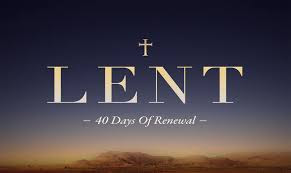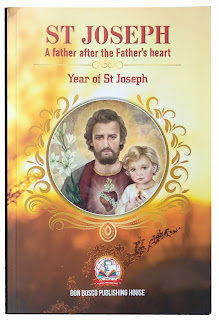Understanding Lent
Lent, I have discovered over the years is a special time of
the year. It is a critical liturgical season that helps us prepare for the
great feast of Easter. My usage of the word ‘critical’ may surprise or upset
some of you. Allow me to clarify. I don’t use it here to refer to the state of
our mental or physical health for the duration of the season (in fact for a
majority of us, Lent isn’t a period of serious prayer and rigorous fasting and
penance). ‘Critical’ here means ‘having a decisive importance’.
I suppose we are all aware that the liturgical year
comprises of five seasons. They are Advent, Christmas, Ordinary Time, Lent and
Easter. The seasons of Lent and Advent are periods of intense preparations for
the great feasts that are to follow. Advent is a four-week long period of
preparation to welcome the Saviour in our midst and to recall the great act of
God: the Incarnation. Similarly, Lent is a 40 day period of inner preparation
to commemorate the Passion, Death and Resurrection of Jesus. With this background
the importance and special nature of Advent and Lent become evident. The goal
of these seasons is clear: preparation for the great feasts of the Incarnation
and Resurrection. Hence, their religious observance is very critical.
Lent requires a change
in attitude and mannerisms to go along with the nature of the preparation and
the mood of the season. The liturgy of Ash Wednesday effectively reflects the
nature and mood of lent. Lent is a serious season but it isn’t a morose one. The
liturgy of Lent lays emphasis on fasting, prayer and repentance. The readings
again and again, and in different words invite us to ‘come back to God’. In the
course of the year we probably hardly ever give serious thought to our
spiritual life. We could be so tied down by our commitments and
responsibilities that the spiritual life becomes a side-business which needs or
worse still, gets attention only on Sundays or feast days! Lent therefore once
again becomes a critical season. It calls attention to the spiritual life and
invites us to set our priorities straight. We are meant for God and to God we
must give our due, not in leftovers or in alms but with all our heart, mind and
soul. Lent brings on this truth quite emphatically. On the very first day, it
hits us with the bombshell: “You are dust and to dust you shall return” (Gen 3:19).
Lent is a season of hope.
As I was saying earlier, Lent and Advent have certain common characteristics.
The atmosphere that these seasons foster is in addition to other things one of
hope. Since they are periods of intense preparation for great feasts they
invite the believer to look to the feast with hope. This hope is not merely a
hope that the season ends soon so that the demands it makes on us are relaxed
and the festive celebration obliterates all memories of sacrifices and
hardships incurred during the preparation period. I recall my days in the
seminary when we would look to Lent with dread. It was that awful time of the
year when our already simple food would become over-simplified and austere, not
by personal choice but by the external pressure of our superiors. It wasn’t
something to look forward to. Instead of helping us grow closer to God it would
turn out to be a time when our stomachs rebelled against the impositions and
throw tantrums so that we would find it difficult to concentrate on spiritual
activities.
 The hope that Lent brings is intrinsically tied up to the
mystery it contemplates upon and that is the Passion, Death and Resurrection of
Jesus. Lent reminds us that our life is limited. It proclaims to us the great
truth that God loves us, without mincing words. The love of God reaches out and
reclaims us from the clutches of sin. Sin has no power over us (Rom 6:14). We
have been purchased at a price (1 Cor 7:23) and that price is the precious
blood of Jesus. The hope that Lent gives us is that suffering and death are not
absolute. They are inevitable but they aren’t final and binding. They have been
conquered by Jesus though his suffering and death on the cross. The fact that
Jesus too suffered grievous pain and finally death ought to fill us with a
sense of comfort. Our God is able to empathize with us in our pain for He knows
what it is about. The Resurrection of Jesus marks the triumph over sin,
suffering and death. It gives us hope that we too will rise like Jesus and
overcome the pain, suffering and death that is connected to mortal life.
The hope that Lent brings is intrinsically tied up to the
mystery it contemplates upon and that is the Passion, Death and Resurrection of
Jesus. Lent reminds us that our life is limited. It proclaims to us the great
truth that God loves us, without mincing words. The love of God reaches out and
reclaims us from the clutches of sin. Sin has no power over us (Rom 6:14). We
have been purchased at a price (1 Cor 7:23) and that price is the precious
blood of Jesus. The hope that Lent gives us is that suffering and death are not
absolute. They are inevitable but they aren’t final and binding. They have been
conquered by Jesus though his suffering and death on the cross. The fact that
Jesus too suffered grievous pain and finally death ought to fill us with a
sense of comfort. Our God is able to empathize with us in our pain for He knows
what it is about. The Resurrection of Jesus marks the triumph over sin,
suffering and death. It gives us hope that we too will rise like Jesus and
overcome the pain, suffering and death that is connected to mortal life.
Besides fostering hope, Lent is a time for renewal. This is in fact its key character. It is a
retreat of sorts. When you come to think of it, retreats are modeled around the
season and spirit of Lent. Recall the key characteristics of a retreat:
silence, long spans of prayer, moments of praise, worship and thanksgiving,
adoration of the Blessed Sacrament, sessions on repentance, forgiveness and
healing, testimonies, fasting, abstinence.
Perhaps you could add a few more details but you get the general idea.
In a retreat there is a preacher or preachers who help you think about life and
your relationship with God and others. Their foundation is of course the Word
of God and it is the Word of God that challenges, instructs and admonishes us
during Lent. In other words, the Word of God does the work of the preacher. It
preaches to us directly without a human interpreter. All scripture is inspired
by God and is useful for instructing, convicting, correcting and training in
righteousness (2 Tim 3:16); it is alive and active, sharper than any double-edged
sword piercing until it divides soul from spirit, joints from marrow; it is
able to judge the thoughts and intentions of the heart. (Heb 4:12). The
readings call us to repentance, prayer, fasting, almsgiving and spiritual
growth. In a retreat we are asked to maintain silence so that we can attune
ourselves to our conscience and to God’s voice. The mood of Lent encourages
silence and reflection. Liturgical changes like omitting the Gloria and
Alleluia indicate the introspective and introverted character of the season.
Lent is meant to be lived and not merely speculated upon. At
every level, it is a living experience. Even though this article is entitled
‘Understanding Lent’, I do not intend it to remain as words on paper. I hope
that it breathes life into the way we approach and live out the season. The aim
of ‘understanding’ Lent is that we may live it better. When we understand what
something is about we are able to enter deeper into its reality and grasp its
core significance. This precisely is my aim although I haven’t said everything
about Lent. There is much more to be said. We are nearing the middle mark and
it will do us good to sit down for a little evaluation of how we have begun
Lent and how we can live the remainder of it.




Comments
Post a Comment